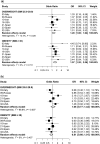Body mass index and gastric cancer risk: results from the Stomach Cancer Pooling Project Consortium
- PMID: 41016748
- PMCID: PMC12476909
- DOI: 10.1093/ije/dyaf160
Body mass index and gastric cancer risk: results from the Stomach Cancer Pooling Project Consortium
Abstract
Background: Body mass index (BMI) has been associated with gastric cancer (GC), though results are conflicting regarding the GC subsites of cardia and non-cardia. This study aims to evaluate the associations between BMI and GC risk, focusing on these distinct anatomical subsites.
Methods: We pooled data from seven case-control studies from the Stomach Cancer Pooling (StoP) Project. Pooled odds ratios (ORs) and the corresponding 95% confidence intervals (CIs) of GC risk across BMI categories (normal weight, overweight, obesity) were calculated by pooling study-specific ORs through random-effects meta-analytic models. The dose-response relationship between BMI and the risk of GC cancer was assessed by using a one-stage mixed-effects logistic regression model. Results were stratified according to cardia and non-cardia GC.
Results: The analysis comprised 1478 GC cases, including 511 cardia and 967 non-cardia cases, and 6671 controls. There was an increased risk of cardia GC among obese patients (OR 1.57, 95% CI 1.20-2.06), while no association was found for non-cardia GC (OR 0.82, 95% CI 0.66-1.01). Restricting the analysis to population-based studies, the association for cardia GC became stronger for obese (OR 1.65, 95% CI 1.09-2.48) and overweight (OR 1.62, 95% CI 1.10-2.39) patients. The dose-response meta-analysis showed an increased risk of cardia GC with increasing BMI values, ranging from a null effect at a BMI of 21.75 to an OR of 2.06 (95% CI 1.22-3.48) for a BMI of ≥40.
Conclusion: Our results indicate an association between higher BMI categories and the risk of cardia GC, whereas no association was found with non-cardia GC.
Keywords: body mass index; cancer prevention; gastric cancer.
© The Author(s) 2025. Published by Oxford University Press on behalf of the International Epidemiological Association.
Conflict of interest statement
None declared.
Figures



